The Adventure of a Lifetime! Past Review
By Willow S (Neuroscience, The College of Wooster) - abroad from 08/24/2014 to 12/06/2014 with
SIT Study Abroad: Peru - Indigenous Peoples and Globalization
I learned a lot about the peoples and cultures of Peru. Additionally, I greatly improved my Spanish skills and feel much more confident in my ability to communicate with others in Spanish. I made many great friends, both Peruvian and from the states, that I know I will stay in touch with for a long time to come. I learned many things about myself as well, and feel much stronger and more independent than I was before my time abroad.
Review Photos
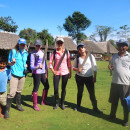
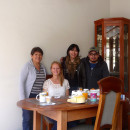
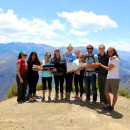
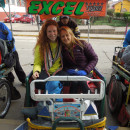
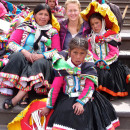
Personal Information
| How much international exposure did you have prior to this program? | 1 month - 6 months |
Review Your Program
|
* Overall educational experience
Academic rigor, intensity, resources, etc. |
The program and courses offered were wonderful, although a few lectures were dry at times. However, I wish we had had the opportunity to learn more Quechua, because it would have been very useful on Taquile. I also feel like some students didn't receive sufficient support for their ISPs. |
|
* Host Country Program Administration
On-site administration of your program |
The program staff were wonderful. Julia, Pati, Mily, and Alex were always very supportive, and I felt I could talk to them about whatever I needed to. They were also very interested in our feedback for the continuous improvement of the program. I absolutely adore Mily, who was like a mother to me and the other students. She is lively and energetic, and always has a smile on her face. She is the kind of person who will brighten your day. |
|
* Housing:
How satisfied were you with your living arrangements? |
I loved my host family! I lived 5 minutes from the school, and had a mother and host brother. I don't eat a lot of gluten, rice, or potatoes, and my host mom was very accommodating with the food she made. I always felt safe in my house, and truly felt like a part of their family. The homestay experience was one of the highlights of my program. |
| * Food: |
The food that my mother made for me was delicious. That being said, the Peruvian diet is comprised of a lot of carbs (namely white rice and many of the 4,000+ varieties of potato) and meat, which is not what I am accustomed to eating. I love salads and fresh vegetables which isn't possible in many regions of Peru due to the fact that the water isn't potable. What I found to work for me was being flexible, and looking at my new diet as part of the study abroad cultural experience. I loved the variety of fresh fruit, and the cafes are full of delicious empanadas, pies, cakes, and other sweet and savory treats. The more open you are to eating differently than you might back home, the better off you will be. |
|
* Social & Cultural Integration:
How integrated did you feel with the local culture? |
I felt very integrated into Peruvian culture during my program. Initially, my host family was my primary connection. They were always speaking to me in Spanish, and I would spend some afternoons chatting in the kitchen with my mom and learning how to make local dishes. After 2 weeks I met my then-boyfriend when our whole group went out in the Plaza de Armas. We ended up dating for the entirety of the program, and he was definitely someone who taught me a lot about the culture. I spent time with him at the club where he worked, helping to set up in the evenings. It was there that I learned how to dance salsa and bachata with the employees, who were all very friendly. He also took me to restaurants and overlooks of Cusco that weren't very touristy. I felt like I really got a different view of the city by spending time with him, and am grateful I experienced another perspective. Even though my situation was unique, I know that the more engaged you are and the more you want to take part in the culture, the more successful you will be in that regard. Peruvians are very friendly and interested in sharing their culture with foreigners, so all it takes is a little effort from your side and you will be surprised how much you learn. |
|
* Health Care:
How well were health issues addressed during the program? |
I never had any personal health problems during the program, except for a minor cold. If you are open to traditional medicine, you can find a variety of natural remedies for all sorts of things. The SIT staff also provided us with many basic medications (motion sickness pills, advil, etc.) for minor health issues. In order to go on the program, there are a variety of recommended vaccines. If you are someone who hasn't been vaccinated for moral and/or religious reasons, you can waive all but the yellow fever vaccine. That is required by the Peruvian government for all persons who enter the Amazon, which is one of the educational excursions. |
| * Safety: |
Cusco is a relatively safe city to begin with, and the neighborhood of Magisterio where almost all the host families are located is one of the nicest and safest of all. That being said, no city is perfect. I never had any problems, and even felt safe walking home at night. However, things to watch out for are: stray dogs, which are everywhere and if you are scared of dogs be sure to give them space, and dark alleys when you are alone or walking at night. These things could apply to almost any city. One piece of advice is to make sure that you walk each other home at night after going out (this especially applies to girls). Nothing bad ever happened to people on my program, but things have happened to other students in the past who weren't thinking and decided to walk home alone in a notoriously unsafe area. One more thing to be aware of is your personal belongings (i.e. backpacks, purses, etc.) People are very good at pick-pocketing without you noticing. This is especially common in crowded markets or on the combi, and being a foreigner makes you a target. |
| If you could do it all over again would you choose the same program? |
Yes
|
Finances
|
* Money: How easily were you able to live on a student's budget?
(1 = not very easy/$200+ on food & personal expenses/week, 2.5 = $100/week, 5 = very easily/minimal cost) |
It was very easy to live on a student budget. If you didn't want to spend much money, you really don't have to. I ended up at cafés a lot to do work since they always have wifi. That was the majority of my spending, since you can't sit there for free. However, one of my favorite cafés had chocolate croissants for 1 sole (about 40 cents), so budgeting isn't terribly difficult! |
| Not including program expenses, about how much money did you spend on food and other expenses each week? | Not much, because my host family fed me and I didn't eat out a lot. |
| Do you have any general money-saving tips for future study abroad participants? | Enjoy the food your host family provides! Its delicious, free (well, part of your program fee), and its a great way to spend time learning more about the culture. Many of my friends who ate out and drank found themselves spending a lot of money. |
Language
| * Did your program have a foreign language component? | Yes |
|
How much did the program encourage you to use the language?
0 = No encouragement, 5 = frequent encouragement to use the language |
If someone who was Peruvian was around, we were required to speak Spanish. That included our staff, so we spoke Spanish a lot! |
| How would you rate your language skills at the beginning of the program? | Intermediate |
| How would you rate your language skills at the end of the program? | Advanced |
| What was the highest level language course you had completed prior to departure? | A 200-level course in college |
| How many hours per day did you use the language? | |
| Do you have any tips/advice on the best ways to practice the language for future study abroad participants? | Honestly practicing with your host family is one of the best ways. Other than that, making friends outside of the program or making the conscious decision to speak Spanish with your friends from the states is a great way too. |
Other Program Information
|
* Where did you live?
Select all that apply |
|
|
* Who did you live with?
Select all that apply |
|
|
* Who did you take classes with?
Select all that apply |
|
| About how many local friends did you make that you will likely keep in touch with? |
A Look Back
| * What did you like most about the program? |
|
| * What could be improved? |
|
| * What do you know now that you wish you knew before going on this program? | Bring cash with you! Most importantly, make sure all the bills are new and don't have rips or stains. Peruvians are very picky with exchanging money, and if a bill is even slightly imperfect they won't take it. |
Reasons For Studying Abroad
| To help future students find programs attended by like-minded individuals, please choose the profile that most closely represents you. |
The Academic or LinguistYou went abroad with specific academic goals in mind; the program credentials and rigor of your coursework abroad were very important to you. You had a great time abroad, but never lost sight of your studies and (if applicable) were diligent with your foreign language study. Good for you! |
Individual Course Reviews
| Course Name/Rating: |
Individual Study Project |
| Course Department: | Anthropology/Spanish |
| Instructor: | Alex Alvarez/Marco Villasante |
| Instruction Language: | Spanish |
| Comments: | The ISP was by far the most challenging part about my study abroad experience. That being said, it was also one of the most rewarding. Each student has one month to complete a research investigation of their choice, related to the program theme. I spent 2 weeks in the rural sierra, working with schools who taught using bilingual intercultural education in Quechua and Spanish. I got to live with some of the teachers at one of the rural schools, and formed relationships with both the students and teachers. After completing my ISP, including a 60-page paper written in Spanish, I felt incredibly accomplished and that I had learned a lot about Peruvian culture in an experiential manner. |
| Credit Transfer Issues: |








